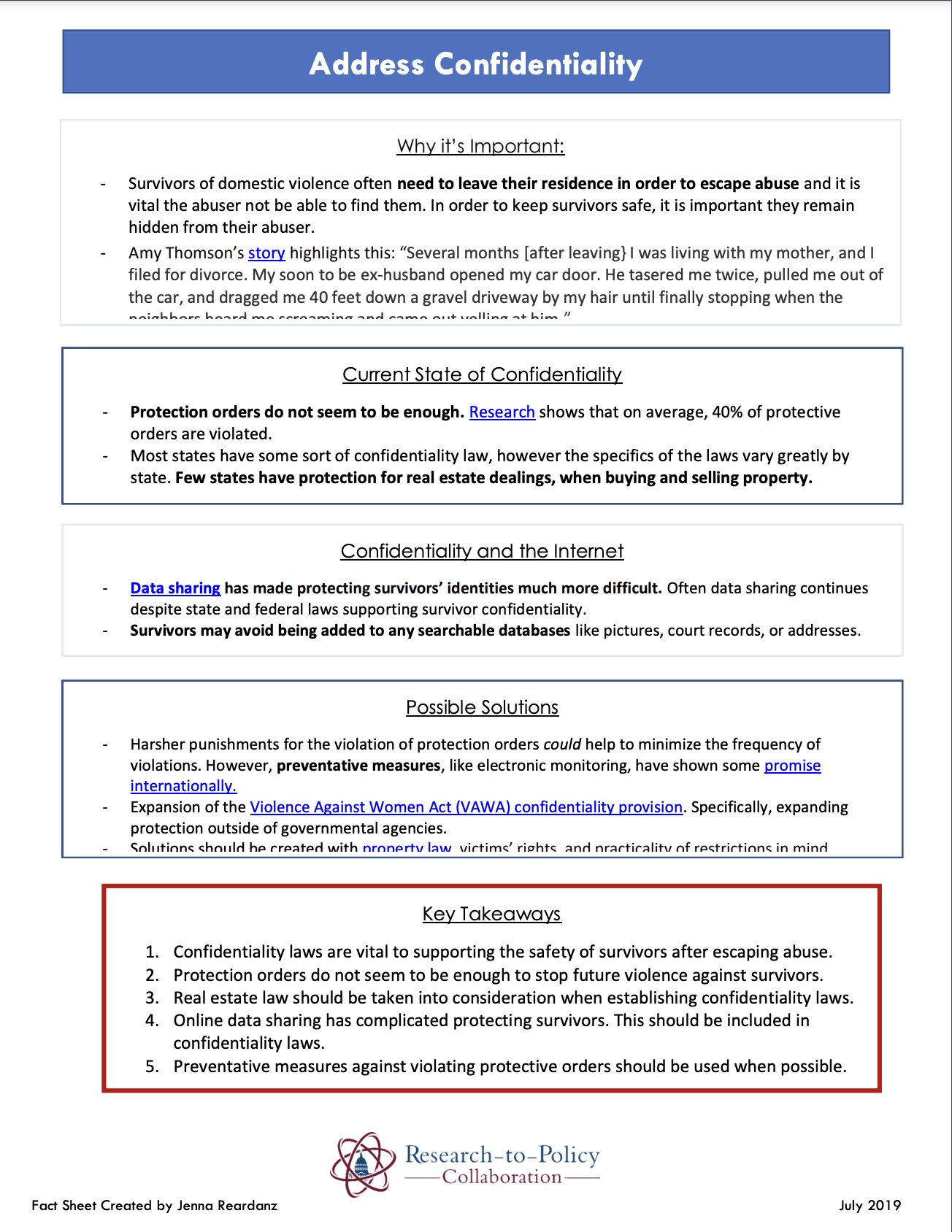
Why It’s Important
- Survivors of domestic violence often need to leave their residence in order to escape abuse and it is vital the abuser not be able to find them. In order to keep survivors safe, it is important they remain hidden from their abuser.
- Amy Thomson’s story highlights this: “Several months [after leaving] I was living with my mother, and I filed for divorce. My soon to be ex-husband opened my car door. He tasered me twice, pulled me out of the car, and dragged me 40 feet down a gravel driveway by my hair until finally stopping when the neighbors heard me screaming and came out yelling at him.”
Current State of Confidentiality
- Protection orders do not seem to be enough. Research shows that on average, 40% of protective orders are violated.
- Most states have some sort of confidentiality law, however the specifics of the laws vary greatly by state. Few states have protection for real estate dealings, when buying and selling property.
Confidentiality and the Internet
- Data sharing has made protecting survivors’ identities much more difficult. Often data sharing continues despite state and federal laws supporting survivor confidentiality.
- Survivors may avoid being added to any searchable databases like pictures, court records, or addresses.
Possible Solutions
- Harsher punishments for the violation of protection orders could help to minimize the frequency of violations. However, preventative measures, like electronic monitoring, have shown some promise internationally.
- Expansion of the Violence Against Women Act (VAWA) confidentiality provision. Specifically, expanding protection outside of governmental agencies.
- Solutions should be created with property law, victims’ rights, and practicality of restrictions in mind.
Key Takeaways
- Confidentiality laws are vital to supporting the safety of survivors after escaping abuse.
- Protection orders do not seem to be enough to stop future violence against survivors.
- Real estate law should be taken into consideration when establishing confidentiality laws.
- Online data sharing has complicated protecting survivors. This should be included in confidentiality laws.
- Preventative measures against violating protective orders should be used when possible.
The Research-to-Policy Collaboration (RPC) works to bring together research professionals and public officials to support evidence-based policy. Please visit their website to learn more.
Key Information
RPC Website
Research-to-Policy Collaboration
More RPC Resources
RPC Resources
Publication DateJuly 1, 2019
Topic Area(s)Data Systems and EBP, Violence and Victimization
Resource TypeWritten Briefs
Share This Page
Why It’s Important
- Survivors of domestic violence often need to leave their residence in order to escape abuse and it is vital the abuser not be able to find them. In order to keep survivors safe, it is important they remain hidden from their abuser.
- Amy Thomson’s story highlights this: “Several months [after leaving] I was living with my mother, and I filed for divorce. My soon to be ex-husband opened my car door. He tasered me twice, pulled me out of the car, and dragged me 40 feet down a gravel driveway by my hair until finally stopping when the neighbors heard me screaming and came out yelling at him.”
Current State of Confidentiality
- Protection orders do not seem to be enough. Research shows that on average, 40% of protective orders are violated.
- Most states have some sort of confidentiality law, however the specifics of the laws vary greatly by state. Few states have protection for real estate dealings, when buying and selling property.
Confidentiality and the Internet
- Data sharing has made protecting survivors’ identities much more difficult. Often data sharing continues despite state and federal laws supporting survivor confidentiality.
- Survivors may avoid being added to any searchable databases like pictures, court records, or addresses.
Possible Solutions
- Harsher punishments for the violation of protection orders could help to minimize the frequency of violations. However, preventative measures, like electronic monitoring, have shown some promise internationally.
- Expansion of the Violence Against Women Act (VAWA) confidentiality provision. Specifically, expanding protection outside of governmental agencies.
- Solutions should be created with property law, victims’ rights, and practicality of restrictions in mind.
Key Takeaways
- Confidentiality laws are vital to supporting the safety of survivors after escaping abuse.
- Protection orders do not seem to be enough to stop future violence against survivors.
- Real estate law should be taken into consideration when establishing confidentiality laws.
- Online data sharing has complicated protecting survivors. This should be included in confidentiality laws.
- Preventative measures against violating protective orders should be used when possible.
The Research-to-Policy Collaboration (RPC) works to bring together research professionals and public officials to support evidence-based policy. Please visit their website to learn more.

Key Information
RPC Website
Research-to-Policy Collaboration
More RPC Resources
RPC Resources
Publication DateJuly 1, 2019
Topic Area(s)Data Systems and EBP, Violence and Victimization
Resource TypeWritten Briefs
Share This Page
LET’S STAY IN TOUCH
Join the Evidence-to-Impact Mailing List
Keep up to date with the latest resources, events, and news from the EIC.




